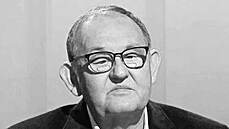Not even two weeks after his death, the lower house of Parliament (Chamber of Deputies) was presented by the government with a draft law, which states “Václav Havel contributed to freedom and democracy.” Artist Lukáš Gavlovský plans to create a giant heart sculpture from the wax of the thousands of candles people lit on Wenceslas Square in tribute to the leader of the Velvet Revolution and first post-communist president of Czechoslovakia and the independent Czech Republic.
Although not universally loved, Havel, who signed his name with a heart, has left a deep furrow on the country that will not soon disappear. If we are wise enough and cultivate the seeds of “truth and love” that he planted to prevail over “lies and hatred”, we may reap the rewards in years to come.
From Jaroslav Škárka to Karolína Peake
From the very start, the eleventh year of the third millennium was far from ideal. By April 2011, the coalition government of the senior Civic Democrats (ODS) and junior partners TOP 09 and Public Affairs (VV) was already mired in its second crisis. Round two began with assertions by the then VV vice-chairman Jaroslav Škárka that party founder, paymaster and de facto chairman Vít Bárta (then the transport minister) had been bribing party MPs for their silence (over dubious practices) and loyalty (to him and his positions).
The then head of the VV parliamentary group, Kristýna Kočí, came forward with a similar story of envelopes stuffed with cash (Škárka and Kočí were soon expelled from or quit the party.) Ever more secret and compromising recordings came forward casting VV and in particular Bárta in a bad light, and in became apparent that Kočí had been in contact with ODS parliamentary club head Petr Tluchoř, who accused the VV leader of using the police (as well as the ABL security agency he founded) to spy on other politicians and abused official information.
Kočí and Tluchoř were said to be working to split the VV group and persuade others in the ODS and TOP 09 to form a governing coalition that would be free of Bárta and those loyal to him. Meanwhile, even more damning than the allegations of bribery and other mudslinging was the Mláda fronta Dnes story based on recordings made at meetings of ABL’s top managers a couple of years ago: Bárta revealed he got into politics to drum up more business for the security agency by winning government contracts.
Prime Minister Petr Nečas (ODS) was in a difficult position, having pledged zero tolerance for corruption in government yet needing to get along with President Václav Klaus, who was highly protective of Bárta and other VV party members (notably Education Minister Josef Dobeš). This is why it took until June for the April crisis to result in the resignations of Bárta (transport) and nominal party chairman Radek John (interior), who were replaced by Pavel Dobeš (VV) and Jan Kubice (unaffiliated), respectively. To placate the party, Karolína Peake was given the role of Deputy PM in charge of combating corruption).
Ministerial exchanges
A June addendum to the coalition agreement stabilized the situation only in the sense that VV stopped publicly threatening to quit the coalition and bring about the collapse of the center-right government. Another crisis came in August when TOP 09 ministers refused to attend Cabinet meetings after the controversial ultra-right former director of the Education Ministry’s human resources department, Ladislav Bátora, referred to Foreign Minister Karel Schwarzenberg, the TOP 09 party chairman, as pathetic “sputtering” old man and Dobeš failed to push his advisor to make amends.
TOP 09 demanded Bátora (whom Finance Minister and TOP deputy chairman Miroslav Kalousek called a “fascist”) be sacked from his position at the ministry and later demanded the resignation of Dobeš himself. But both enjoy Klaus’ protection, and in the end, the prime minister, with Schwarzenberg’s blessing, settled the spat. Bátora was given another position at the ministry — actually a promotion — but two months later, he left on his own accord to avoid compromising the work of the conservative euro-skeptic grouping D.O.S.T. (“Trust, Objectivity, Freedom and Tradition”), whose acronym translates as “enough” in English, saying he could no longer keep his word to Dobeš and refrain from intervening in public life.
Nečas had said that none of the Cabinet ministers had a guaranteed place in his government, and in what many said was a move to solidify his own political future, sacked Ivan Fuksa (agriculture) — a close ally of ODS parliamentary club head Petr Tluchoř, who had conspired with Kočí —replacing him with Petr Bendl, a former governor of the central Bohemian region. In the autumn, two ministers were forced out of government due to allegations or suspicions of corruption: Martin Kocourek (ODS, industry and trade) and Jiří Besser (TOP 09-STAN, culture minister), who were replaced by Martin Kuba (ODS) and Alena Hanáková (TOP 09-STAN), respectively.
Besser submitted his resignation to Nečas in the wake of revelations that he had twice failed to list his partial ownership in a Florida company in asset declarations to parliament and had therefore violated the conflict of interest law. It was Besser’s partner in the company — Pavel Hrách, who was convicted in early November of bribing a board member of the Czech Consolidation Agency (ČKA), the state bail-out agency — that was the minister’s political undoing.
Similarly, Kocourek resigned after admitting he had “diverted” some Kč 16 million to his mother’s bank account to hide it from his estranged wife during their divorce settlement in 2008. By all accounts Kocourek failed to present a convincing story of how he earned the money, why he placed it in his mother’s account, and why in March 2008 she invested it with Key Investments — a brokerage that has since lost its license over suspect transactions, many involving hundreds of millions of the Prague 6, 10 and 13 districts’ money.
Unfortunately, the business dealings and character of Kocourek’s successor have already been called into question: Kuba, who was deputy governor of the South Bohemia region prior to his appointment as minister, is thought to be backed by the controversial businessman Pavel Dlouhý, whom former ODS prime minister Mirek Topolánek once called the “Godfather” (as in a mafia-type figure) of the region. But that could prove an asset to Nečas in the elections before the ODS congress next year, bolstering his sway in the region, in the same way that Bendl in central Bohemia is beholden to him for the ministerial post.
Fundamental reforms
Despite all the infighting within the Cabinet, the Nečas government did manage to push through a lot of legislation. Since the beginning of his current term, the lower house of Parliament has received a total of 269 laws, of which 169 were presented by the government and 66 by deputies. The body has approved 159 laws, of which 49 were returned to them by the Senate, where the main opposition center-left Social Democrats (ČSSD) enjoyed a majority since November 2010. The upper house of Parliament overruled 18 laws relating to raising taxes.
After six days of obstruction by opposition MPs, the coalition passed 14 reform bills on Nov. 6, including social security and pension reforms and a measure to increase the lower VAT rate from 10 to 14 percent as of 2012, and push through a unified VAT rate of 17.5 percent in 2013. Some of the austerity measures contained in the bills were central to the draft budget for 2012. President Klaus neither signed nor vetoed the pension reform, thus allowing it to enter into force; meanwhile, the ČSSD has pledged to reverse the reform bills when it next comes to power.
In the Senate, the new Civil Code — ten years in the making and approved by the lower house of Parliament in November—awaits a hearing. Senators will also consider an amendment to the Constitution allowing for direct presidential elections; optimists see it passing the Senate with relative ease, but pessimists foresee further complications, with objections by ODS and ČSSD senators alike. We’ll see.
Václav Klaus
While it’s true that Václav Klaus stepped in to save the government of Petr Nečas back in December 2010, it’s also plain to see that he has been disappointed in the government’s performance over the past year. The Czech president had also seriously complicated the Nečas government’s work by rejecting further integration of the European Union but also championing sovereign currencies or the burial of the euro.
Meanwhile, Klaus is openly critical of Schwarzenberg, the foreign minister, when it comes to EU relations, while members of the government, most likely including the prime minister, have created a dual track foreign policy — all of which makes the Czech Republic appear unreliable and not very credible on the international scene. And as Klaus wants to remain an active, high-profile force in Czech politics, his second term as head of state ends in March 2013, and the Constitution prohibits him from seeking a third term at Prague Castle, the dual track foreign policy will continue to be an issue in coming years. Open conflict between the head of state and government could result, to crippling effect.





